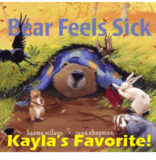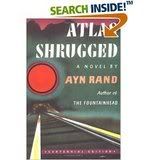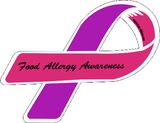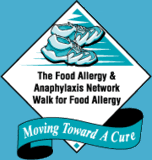Friday, November 16, 2007
Milk Allergy Article
My Mother forwarded this article to me today. I had heard this previously, but more in a 'through the grapevine' sort of way. Like my mood about Kayla's allergy wasn't bad enough this week...
I will be running to the airport soon to pick up my GM and I plan on getting on-line to post and visit this weekend. I need a swift kick to get me back into gear. Any volunteers...?
You find the original article here.
Study: Milk allergy can take years longer to outgrow
WASHINGTON (CNN) -- When Julianne Jaffe Cohen was looking at colleges for her son Jeremy, the first question she asked was not about the academics. Instead, she wanted to know whether there was a hospital nearby.
Jeremy Cohen has already had one major allergic reaction since starting college this fall.
She had "sleepless nights in the beginning, but I was determined to let this child live his life," Cohen said.
Jeremy Cohen is allergic to all dairy products which means if he eats any food containing even a small amount of milk, cheese, or yogurt, he can become very ill.
"At the slightest consumption of dairy, I break out into hives, coughing and have to go to the hospital. ... It's a very, very severe reaction," Jeremy said in a telephone interview from the campus of Colgate University in Hamilton, New York, where he is a freshman.
His mother's fears have already been realized. Since he started school this fall, Jeremy has had one major allergic reaction that sent him to the hospital after eating at a restaurant. "All of a sudden I started feeling sick, coughing, turned bright red, and had hives all over." A policeman in the neighborhood drove him to a nearby hospital. Watch why milk allergies are more difficult to outgrow. »
A new study published in the November issue of the Journal of Allergy and Clinical Immunology suggests that 18-year-old Jeremy is not alone. The study showed that most children who had a milk allergy as infants did not outgrow the disease before entering elementary school, according to Dr. Robert Wood, chief of Pediatric Allergy and Immunology at the Johns Hopkins University School of Medicine in Baltimore, Maryland. Wood, one of the study's authors, said that finding was contrary to previous research.
For infants and young children, milk allergy is still the most common food allergy, affecting 2 percent to 3 percent of that population, the study noted.
Researchers found a "significantly different natural history of milk allergy than what had been reported in virtually all of the previous studies. ... They would have said that the vast majority of milk allergy is outgrown by age 3 and if not by 3 certainly by 5 or 6," Wood said.
According to the study, which examined children who had been sent by a doctor to a pediatric allergy center, "the prognosis for developing tolerance [to milk] is worse than previously estimated."
The study found that 19 percent of the group outgrew their allergy to milk by the age of 4; 42 percent by the age of 8; 64 percent by the age of 12. The study found that 79 percent of the group outgrew their allergy to milk by the age of 16, which means one in five did not outgrow the milk allergy by that age.
The authors said that the character of cow's milk allergy "has changed over time ... and may now truly be a more persistent disease."
"One of the huge frustrations for parents of milk-allergic children is that they will typically find that someone with peanut allergy gets lots of respect and lots of precautions taken and the same respect is almost impossible to get for milk allergy," Wood says. Examples of precautions are cleaning school lunch tables well or placing children with peanut butter at a separate table. "Whatever precautions need to be in place for something like peanut allergy, need to be in place for milk allergy as well," says Wood.
The study also found that even though many did not outgrow the allergy by age 3, some patients were able to outgrow it "well into adolescence," indicating that "there is no age at which outgrowing CMA (cow's milk allergy) is impossible."
When exposed to milk, children in the study had a range of reactions, including rashes, hives, gastrointestinal symptoms, respiratory difficulties and even multiple-organ anaphylactic shock, a severe, sometimes fatal reaction.
With data collected on 807 patients, this was the largest group of milk-allergic children ever studied.
Ninety-one percent of the children studied were allergic to at least one other food besides milk, suggesting this might be a particularly allergic group, especially since they had been referred to a pediatric allergy clinic.
The study found that kids who had asthma and hay fever were less likely to outgrow milk allergy. There was also a worse prognosis for those who had ever received infant formula.
An estimated 2 percent of U.S. adults and 4 percent to 8 percent of children suffer from food allergies, and about 150 individuals die from them every year, according to the Centers for Disease Control and Prevention.
A study by the Food Allergy and Anaphylaxis Network and the Mount Sinai School of Medicine in New York showed the number of children allergic to peanuts doubled between 1997 and 2002.
Wood and his team concluded that a simple blood test measuring milk-specific, or IgE antibodies can have enormous value in predicting who will and will not outgrow a milk allergy. "That test has pretty significant value in predicting the natural history" of the disease and is widely available, Wood said.
Dr. Wood last year saw 75 patients allergic to milk heading to college.
Jeremy Cohen and his family believe he will be allergic to milk for life, a belief supported by the study. Though he is a college student who has to watch what he consumes, he won't let that suppress his appetite for enjoying campus life. E-mail to a friend
I hope everyone is having a great weekend and getting ready for Thanksgiving. I am having dinner here, so will post our dairy-free menu (feeding 14) at a later date - it is not yet finalized. :)
I will be running to the airport soon to pick up my GM and I plan on getting on-line to post and visit this weekend. I need a swift kick to get me back into gear. Any volunteers...?
You find the original article here.
Study: Milk allergy can take years longer to outgrow
WASHINGTON (CNN) -- When Julianne Jaffe Cohen was looking at colleges for her son Jeremy, the first question she asked was not about the academics. Instead, she wanted to know whether there was a hospital nearby.
Jeremy Cohen has already had one major allergic reaction since starting college this fall.
She had "sleepless nights in the beginning, but I was determined to let this child live his life," Cohen said.
Jeremy Cohen is allergic to all dairy products which means if he eats any food containing even a small amount of milk, cheese, or yogurt, he can become very ill.
"At the slightest consumption of dairy, I break out into hives, coughing and have to go to the hospital. ... It's a very, very severe reaction," Jeremy said in a telephone interview from the campus of Colgate University in Hamilton, New York, where he is a freshman.
His mother's fears have already been realized. Since he started school this fall, Jeremy has had one major allergic reaction that sent him to the hospital after eating at a restaurant. "All of a sudden I started feeling sick, coughing, turned bright red, and had hives all over." A policeman in the neighborhood drove him to a nearby hospital. Watch why milk allergies are more difficult to outgrow. »
A new study published in the November issue of the Journal of Allergy and Clinical Immunology suggests that 18-year-old Jeremy is not alone. The study showed that most children who had a milk allergy as infants did not outgrow the disease before entering elementary school, according to Dr. Robert Wood, chief of Pediatric Allergy and Immunology at the Johns Hopkins University School of Medicine in Baltimore, Maryland. Wood, one of the study's authors, said that finding was contrary to previous research.
For infants and young children, milk allergy is still the most common food allergy, affecting 2 percent to 3 percent of that population, the study noted.
Researchers found a "significantly different natural history of milk allergy than what had been reported in virtually all of the previous studies. ... They would have said that the vast majority of milk allergy is outgrown by age 3 and if not by 3 certainly by 5 or 6," Wood said.
According to the study, which examined children who had been sent by a doctor to a pediatric allergy center, "the prognosis for developing tolerance [to milk] is worse than previously estimated."
The study found that 19 percent of the group outgrew their allergy to milk by the age of 4; 42 percent by the age of 8; 64 percent by the age of 12. The study found that 79 percent of the group outgrew their allergy to milk by the age of 16, which means one in five did not outgrow the milk allergy by that age.
The authors said that the character of cow's milk allergy "has changed over time ... and may now truly be a more persistent disease."
"One of the huge frustrations for parents of milk-allergic children is that they will typically find that someone with peanut allergy gets lots of respect and lots of precautions taken and the same respect is almost impossible to get for milk allergy," Wood says. Examples of precautions are cleaning school lunch tables well or placing children with peanut butter at a separate table. "Whatever precautions need to be in place for something like peanut allergy, need to be in place for milk allergy as well," says Wood.
The study also found that even though many did not outgrow the allergy by age 3, some patients were able to outgrow it "well into adolescence," indicating that "there is no age at which outgrowing CMA (cow's milk allergy) is impossible."
When exposed to milk, children in the study had a range of reactions, including rashes, hives, gastrointestinal symptoms, respiratory difficulties and even multiple-organ anaphylactic shock, a severe, sometimes fatal reaction.
With data collected on 807 patients, this was the largest group of milk-allergic children ever studied.
Ninety-one percent of the children studied were allergic to at least one other food besides milk, suggesting this might be a particularly allergic group, especially since they had been referred to a pediatric allergy clinic.
The study found that kids who had asthma and hay fever were less likely to outgrow milk allergy. There was also a worse prognosis for those who had ever received infant formula.
An estimated 2 percent of U.S. adults and 4 percent to 8 percent of children suffer from food allergies, and about 150 individuals die from them every year, according to the Centers for Disease Control and Prevention.
A study by the Food Allergy and Anaphylaxis Network and the Mount Sinai School of Medicine in New York showed the number of children allergic to peanuts doubled between 1997 and 2002.
Wood and his team concluded that a simple blood test measuring milk-specific, or IgE antibodies can have enormous value in predicting who will and will not outgrow a milk allergy. "That test has pretty significant value in predicting the natural history" of the disease and is widely available, Wood said.
Dr. Wood last year saw 75 patients allergic to milk heading to college.
Jeremy Cohen and his family believe he will be allergic to milk for life, a belief supported by the study. Though he is a college student who has to watch what he consumes, he won't let that suppress his appetite for enjoying campus life. E-mail to a friend
I hope everyone is having a great weekend and getting ready for Thanksgiving. I am having dinner here, so will post our dairy-free menu (feeding 14) at a later date - it is not yet finalized. :)


 Name:
Name:





















2 Comments:
You could have written parts of this article as you know all to well. How sad that one allergy gets more cautionary respect than another. Kayla is lucky to have such an aware Mommy that makes her needs known. I have no tolerence for those who would not respect a child's (or adult's) special needs whether it be an allergy or some other handicap. The way you teach your daugher respect for herself and others will help her cope with her allergy and make her aware, tolerant and empathetic of other people's special and not so special needs. All that being said, I will hope and pray she is one who outgrows her allergy.
As Kayla's "nanny" & Sue's "mom", I am so thankful that Sue is so proactive and aware about her allergy. Sue has informed & educated all of us as to how to keep Kayla safe. I am also so much more aware of how my actions affect other peoples children, as well. Having a food allergic child in the family has made me change many of my behaviors "in the outside world".
Thanks Sue. Kayla couldn't have a better advocate.
PS: My son-in-law is also wonderful in handling this issue & his girls. He's a great, hands-on dad.
:)
Post a Comment
<< Home